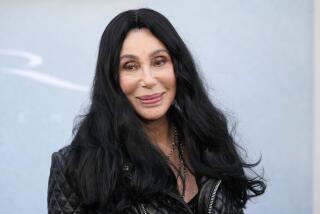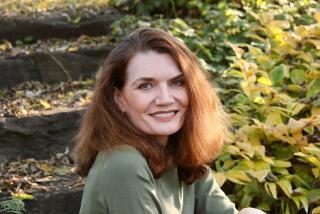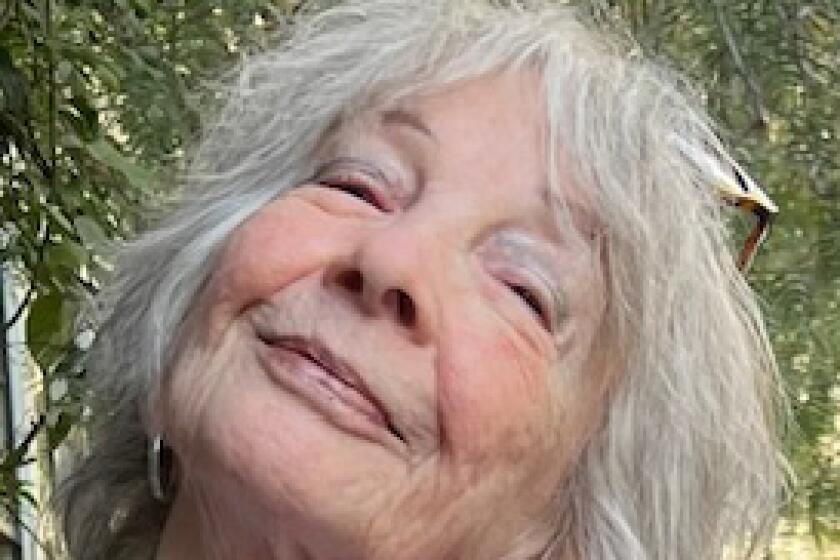<i> To the Editor:</i>
Jonathan Kirsch’s article “Literary L.A.” (Book Review, April 20) and Anna Sklar’s response to it (April 27) touched off a tempest in a not-so-mini teapot. Is the hoopla of the recent book fair at UCLA an expression of nothing more than a gathering of “mutual admirers,” as Sklar claims, or the “renaissance” of Kirsch’s vision? Josh Getlin’s “Writing L.A.” and Steve Wasserman’s “Culture Shock” (Book Review, April 27) suggest that something more than a “two-day mutual admiration fair” is going on. I hope I can act as an honest broker here by offering a third view that incorporates the truths voiced on both sides.
A long life gives one not just a personal but a historical perspective. At the same time, a slow, inexorable build-up of moraine-like cultural deposits isn’t obvious while it is happening, but in looking back over 50 years, something becomes more clear--a renaissance of sorts has indeed occurred.
Upon my discharge from the Army in late 1945, I came back to a Los Angeles that, in many respects, was the Philistia Nathanael West acidly etched in his “The Day of the Locust.” The literary picture in late 1945 had scarcely changed since those days of the locust in the 1930s. There was small interest in the literary arts back then, much less hope for a renaissance. Occasionally, a few hardy souls would meet in Clifton’s Cafeteria on South Broadway where we read our poems and stories to each other. But unlike San Francisco’s North Beach or New York’s Greenwich Village, L.A. has always been too diffuse to boast a Bohemia of its own, where writers and artists could meet, socialize and exchange ideas. That may well be another reason for the lack of a visibly literary community until now.
At Los Angeles City College (and later UCLA) where I signed up for my first courses under the GI Bill, I found myself gravitating toward fellow students who, like myself, had literary aspirations--if not pretensions. Like me, many were veterans on the GI Bill who nursed ambitions to write the Big War Novel.
At first, we wrote for a Los Angeles City College-sponsored literary magazine. But some of the material published in this magazine, Kernal, was too raunchy for the rather strait-laced LACC administration of those times--its first issue was its last. The demise of Kernal presented us with a challenge: We would start a literary magazine independent of any institutional connection. Line was our first venture. Helen Curry, a fine poet who was to make her debut in Poetry, was an early editor, as was this writer and Leroy Robinson, who eventually expatriated himself to Nagasaki, Japan, where he taught English at Nagasaki University and where he still lives. But with not enough copies sold of the 500 printed and with advertisers dropping off, Line survived for just three issues. Some years later, Coastlines, under the editorship of Neal Weisburd, made a second (postwar) attempt at creating a literary revival, but it too folded after a longer run than Line’s run, but only after such young talents as the British-born Denise Levertov and the L.A.-born Bert Meyers, a fine, much neglected lyric poet, had made their appearance in that magazine.
In the late ‘60s, to boost interest in L.A.’s literary history, I wrote an article that appeared in the Calendar section of The Times. Its title was “L.A.’s Little Magazines--a Lively Legacy.” That was long before there was a Book Review section--a revealing commentary itself on how far L.A. has come! The article dealt with the literary scene between the wars, mostly failed efforts whose skeletons lay strewn about L.A.’s literary wasteland.
Fast forward to 1997. Now when I skim through the offering of poetry readings, book signings and Barnes and Noble writing seminars listed on the back page of the weekly Book Review, I recall those early days when the literary community was made up of writers who were isolated by distance and the lack of a literary center and I am convinced that a literary renaissance has indeed taken place. What Sklar has to say about the sad state of book publishing is all too true, too; the conglomerates have indeed taken over and brand names are regnant, with little new blood infused into the literary bloodstream. But that’s a national malaise for which L.A. can hardly be blamed. And how long can we appeal to the ghosts of Nathanael West, Christopher Isherwood, Carey McWilliams, Edmund Wilson and Alfred Kazin before we move on to serious new writers? Wilson and Kazin were East Coast figures and were never really part of the L.A. scene. Even West was a transplanted Easterner.
In sum, I believe that both Jonathan Kirsch and Anna Sklar have made cogent points, but it’s sad that a division should enter the discussion over whether the “renaissance” of literary L.A. is “real” or not. The Epsteins of the Old Pickwick Bookshop and the Stanley Roses are long gone, and although they were treasured and loved by the L.A. book-buying (and -reading) community, the audience among both young and old has grown exponentially since their day. Just check into any bookstore--chain or independent--or any public library and you will see evidence of a hunger for books that was not seen in the “good old days.” Even Sklar admits the legitimacy of “adoring fans” at the book fair.
But whatever their motives (which only they alone can know), better the engaging atmosphere at UCLA last month than the crowded bleachers at the Music Center on the eve of the Academy Awards, where squealing fans help create a scene comparable to something out of West’s “The Day of the Locust.”
Sam Bluefarb, Diamond Bar
****
To the Editor:
The author of a new book awaits with trepidation and a curious kind of loneliness the reception of his book: a favorable review, a critical review, maybe a rave if one lives long enough. But what he wants most of all from a reviewer, however critical, is fairness and an accounting of what he tried to do in the book, as opposed to another book someone might wish to write.
Donald Kirk’s review of “Korea’s Place in the Sun” (Book Review, March 23) had none of that but instead was a lengthy recital of what Kirk thinks about Korea and a highly political misreading of my book. Whenever he has a chance, Kirk makes me out to be an anti-American critic and an apologist for North Korea, while distorting my arguments at every juncture. Thus, for example, I “scorn” Syngman Rhee and “glorify” Kim Il Sung, Kirk’s evidence being that I say Kim was a guerrilla against the Japanese in the 1930s--as opposed to “the contrary view that Kim might have been just a Soviet front man.” No scholar who can read Japanese police and military records (available for 40 years) has denied that Kim fought against the Japanese. He had no relationship with the Soviets from 1932, when he began fighting, until after Pearl Harbor, as attested to by the very Japanese counterinsurgency officers who sought to kill him (and whom I cited).
Kirk seems unable to read my chapter on North Korean corporatism, which is replete with evidence of North Korean repression, which he alleges I forget about, along with various “horrifying reports of refugees who escaped . . . usually via China, to the South.” Well, there have been some horrifying reports, but they have all come in the 1990s, since China and South Korea had no relations before this decade; my book is about nearly a century and a half of Korean modernity. Kirk knowingly announces to your readers that things are “stage-managed for foreigners” in Pyongyang, as if I do not go into detail on my own experiences in being “stage-managed,” as is every other American who has visited that country.
Korea is still in a Cold War time warp, so I suppose ideological attacks like Kirk’s will still find purchase. But your readers should know that Kirk’s pretensions of expertise on Korea will fool none but the ignorant. True, Kirk does have a book on one aspect of Korea, a breathless and most often misinformed account of the Hyundai conglomerate, a book competing with mine at the bookstores, as it happens.
Bruce Cumings, Center for Comparative Studies, Northwestern University
Donald Kirk replies:
I’m sorry Cumings has to engage in such rhetoric in denouncing what was basically a favorable review. There was nothing “highly political” in what I wrote, and I never implied he was “an anti-American critic and an apologist for North Korea.”
Regarding his comments on Kim Il Sung, there is a subtext here. Records from Moscow since the demise of the Soviet Union have countered some of Cumings’ views on the origins of the Korean War. Kim fought with Chinese Communist guerrillas against the Japanese. After the unit was all but wiped out, he and others joined the Russians in Siberia. Commissioned as an officer in the Soviet army, he returned to North Korea after the war.
Regarding Cumings’ defense of his passages on “corporatism,” his observations appear as a rationale (not “apology”) for people and policies in the north. He offers no “evidence” for “North Korean repression.” His excuse for not citing refugee reports is more disingenuous. Much of his book covers current affairs, about which refugees say a lot, and older refugees have gone into the history.
Cumings’ picture of “polite waitresses who served ample portions of tasty Korean and Western food” in Pyongyang reads like a sick joke when compared to images of starvation. His account of Pyongyang as “one of the most efficient, best-run cities in Asia” appears as nonsense to anyone who has shaken his guide long enough to sneak into empty shops or food stalls. His idea of “detail” is to tell us “daily necessities are available” (not true). Nowhere does he suggest he too was “stage-managed.”
Cumings concludes by attacking a book I did on Hyundai several years ago, “Korean Dynasty: Hyundai and Chung Ju Yung,” tossing out disparaging adjectives without substantiation. It’s interesting that Chalmers Johnson of the Japan Policy Research Institute, quoted in a press release as praising Cumings’ book, gave mine a rave in an academic journal. It’s unlikely, however, that Cumings read my book. Otherwise, he would not have made a couple of factual errors cited in my review.
Cumings accuses me of “pretensions of expertise.” I’m not an “expert” at all. I’m just a reporter who’s been going to Korea for 25 years. My writing has occasionally been called “liberal” or “conservative” but never an “ideological attack.” I wonder what “ideology.” Still, I found his book worth reading, assuming its distortions will fool none but the ignorant.
More to Read
Sign up for our Book Club newsletter
Get the latest news, events and more from the Los Angeles Times Book Club, and help us get L.A. reading and talking.
You may occasionally receive promotional content from the Los Angeles Times.





